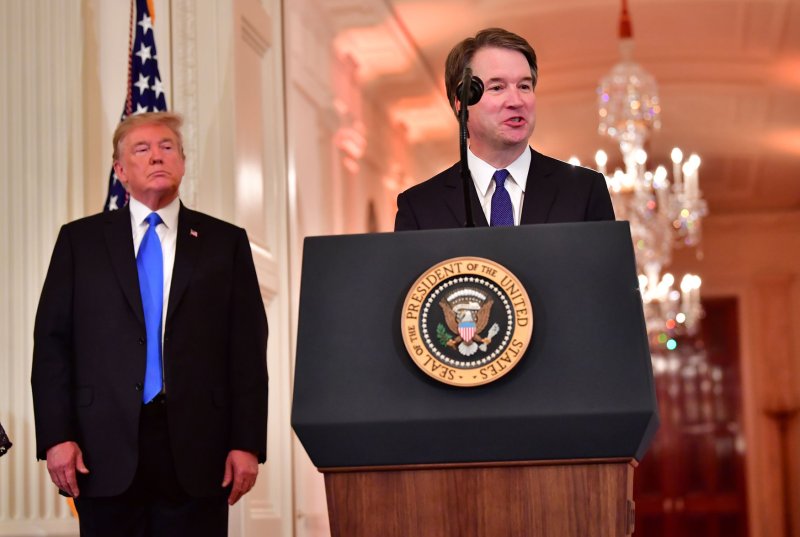1 of 4 | Brett Kavanaugh, President Donald Trump's nominee for Supreme Court Justice, speaks during a ceremony in the East Room at the White House on Monday. Kavanaugh will be replacing retiring Justice Anthony Kennedy. Photo by Kevin Dietsch/UPI |
License Photo
July 9 (UPI) -- President Donald Trump nominated Judge Brett Kavanaugh to the Supreme Court on Monday night.
Kavanaugh has served on the bench of the Washington, D.C., Circuit Court of Appeals since 2006 and if confirmed will replace Supreme Court Justice Anthony M. Kennedy, who announced his plans to step down, effective July 31, late last month.
"What matters is not a judge's personal views but whether they can set aside those views to do what the law and the Constitution require," Trump said before announcing the nomination. "I am pleased to say I have found, without doubt, such a person."
Trump also praised Kavanaugh, 53, for establishing a reputation as a "judge's judge" while serving on the Washington, D.C., Circuit Court.
"Judge Kavanaugh has impeccable credentials, unsurpassed qualifications and a proven commitment to equal justice under the law," Trump said.
In his remarks, Kavanaugh outlined the principles that guide him as a judge.
"A judge must be independent and must interpret the law, not make the law, a judge must interpret statutes as written and a judge must interpret the Constitution as written, informed by history, tradition and precedent," he said.
Kavanaugh said he will begin meeting with the Senate on Tuesday, where he will pledge to keep an open mind in every case if confirmed.
Senate Democratic leader Chuck Schumer issued a statement after the nomination, vowing to "oppose Judge Kavanaugh's nomination with everything I have," adding Kavanaugh would likely rule against reproductive rights and freedoms and welcome challenges to the Affordable Care Act.
"This nomination could alter the balance of the court in favor of powerful special interests and against working families for a generation, and would take away labor, civil, and human rights from millions of Americans. We cannot let that happen. If we can successfully block this nomination, it could lead to a more independent, moderate selection that both parties could support," Schumer wrote.
Senate Republican leader Mitch McConnell issued his own statement praising Kavanaugh as a "superb" selection by Trump.
"He has won the respect of his peers and is highly regarded throughout the legal community," McConnell said of Kavanaugh. "This is an opportunity for Senators to put partisanship aside and consider his legal qualifications with the fairness, respect, and seriousness that a Supreme Court nomination ought to command."
Kavanaugh was born in Washington, D.C., on February 12, 1965. He graduated from Yale Law School in 1990 and went on to become a prosecutor and state judge in Maryland.
He was nominated to the Washington, D.C., Circuit Court on July 25, 2003, but his nomination was stalled by Senators, including Schumer, for three years. Kavanaugh was eventually confirmed by the Senate on May 26, 2006, by a vote of 57-36.
Kavanaugh's nomination represents a potential shift in the court's balance, as Kennedy often served as a swing vote who sometimes sided with a different political ideology.
While serving on the Washington, D.C., Circuit Court Kavanaugh wrote multiple decisions seeking to reign in Obama-era Environmental Protection Agency regulations.
He was also part of a three-judge panel that rejected a temporary restraining order allowing an immigrant teenage girl to get an abortion, delaying the procedure while the government sought a sponsor for the girl. He also dissented on a vote to uphold net neutrality regulations against a challenge brought by telecommunications and other Internet providers in 2017 and rejected two constitutional challenges to the Affordable Care Act.
The nomination is Trump's second high court nomination in 15 months, after Associate Justice Neil Gorsuch was sworn in by Kennedy in April 2017.
The previous three presidents -- Barack Obama, George W. Bush and Bill Clinton -- appointed just two in their entire eight-year presidencies.















